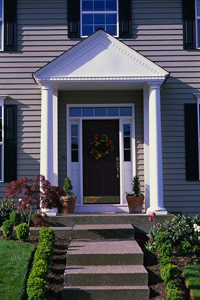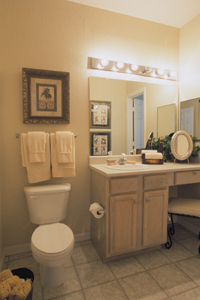Speed Up Your Home Sale with These Fast Fix-ups
Small expenditures of money or time on carefully targeted projects can improve your chances of selling quickly -- and ensure you get the best price possible.
By Liz Pulliam Weston
You don?t have to spend a fortune renovating your house to ensure a quick sale at the best price. Some of the most effective fix-ups are also the cheapest.
Spending just $400 to $500 on fresh landscaping, for example, can boost your home?s value by $1,600  to $1,800, according to a survey of real estate agents conducted by HomeGain, an Internet real estate service. Spend another $300 on cleaning and de-cluttering your home, the survey found, and you could add another $2,000 or more to the sale price.
to $1,800, according to a survey of real estate agents conducted by HomeGain, an Internet real estate service. Spend another $300 on cleaning and de-cluttering your home, the survey found, and you could add another $2,000 or more to the sale price.
To pinpoint the projects that make the most sense, start by touring your property with fresh eyes, as if you were a prospective buyer. Drive or walk up to your house and see how it appears from the street. Walk through the front door and take a look around. You might ask a trusted friend to help you spot problems, clutter and weird smells that you?ve long since stopped noticing. Keep a pen and pad handy to list the projects that need to be done.
On the Outside
Here are some suggestions for the exterior of your home:
- Start at the sidewalk. Landscaping makes a huge difference in how people perceive your home. Whack back overgrown bushes and trees so your house is visible from the street. Plant colorful annuals in the flowerbeds. Keep the lawn green and trimmed, even if you have to hire a gardening service or a local teenager to help.
- Revive a tired exterior. Painting exterior doors and window trim can freshen your home?s look without the huge expense of a complete exterior repainting. Shine or replace worn door knockers and hardware. Replace or remove torn screens or damaged storm windows. Make sure exterior lights are working and have fresh bulbs -- some buyers like to cruise by your home at night to see how it looks.
- Remove outside clutter. Get rid of anything that blocks pathways or clutters up side yards, back yards and patios. This includes toys, excess furniture and tools.
- Clean your windows. You want your home to look as light and bright as possible. Dirty or spotted windows drag down a home?s appearance.
On the Inside
Once inside, inspect your floors, your walls, your kitchen, your bathrooms and your closets -- because your buyers will. Here?s what to tackle:
- Dig out the dirt. You can do it yourself or hire a crew for a day, but a deep cleaning is essential for a good first impression. It?s also key to keep up the cleaning as long as your house is on the market, which will probably mean a daily dusting and vacuum session. Bathrooms and the kitchen should be kept spotless.
- Banish bad smells. Air out your home by throwing open the windows at least once a day (or, in bad weather, by running all your exhaust fans). Don?t cook smelly or greasy foods, which linger in the house. If you have cats, clean the litter box at least once a day. Use potpourri or bake cookies before buyers visit to give your place a ?homey? smell.
- Remove inside clutter. You need to move anyway, so why not get a head start and make your home look larger by packing away at least one-third of your stuff? Stowing away knickknacks, mementos and family pictures helps depersonalize your home, which is actually a good thing: You want potential buyers to picture themselves living in your home instead of being distracted by your personal effects. Consider renting a temporary storage space rather than stuffing your packed boxes in your closets or garage, which will make them look smaller.
- Organize what?s left. Tidy closets and pantries look bigger and more appealing.
- Fix your floors. Real estate agents say buyers really notice the condition of floors. Hardwood should be polished and carpets shampooed or, if they?re in bad shape, replaced. Repair any broken tile or linoleum.

- Brighten your walls. If you?ve painted or wallpapered in recent years, you may be able to get away with just washing your walls. Otherwise, consider repainting your rooms in neutral colors.
Beware the Big Projects
What about bigger projects, such as a kitchen update, a new roof or upgrades to an electrical system? Generally, you won?t get your money?s worth from these projects, but here?s what you should consider:
-
Remodeling is for buyers, not sellers. Major renovations usually don?t pay for themselves, let alone add enough value for you to make a profit, as I wrote about in ?The hidden financial truth about remodeling.? So why would you want to go through the hassle and the expense right before you move? Concentrate instead on smaller fixes with bigger impact, and let your buyers remodel to suit themselves.
-
Beware of deferred maintenance. Buyers expect your home to be in decent shape. That means a roof that doesn?t leak, paint that isn?t peeling and household systems (heating, cooling, electric and plumbing) in good repair. If you?ve neglected your home, you face a tough choice. You?re unlikely to recoup much of the cost of your repairs in the form of a higher sales price, since buyers are unlikely to pay you a premium for maintenance you should have been doing all along. Yet not making the fixes may turn off buyers altogether. Talk with an experienced real estate agent about which projects you should tackle before listing your home.
Consider a Pre-sale Inspection.
Hiring your own inspector before you put your home on the market can alert you to problems you didn?t know about, giving you a chance to fix them before they complicate -- or ruin -- a potential sale. If the repairs are expensive, you may face the same difficult choice described above. But that?s better than being surprised once your home is in escrow.